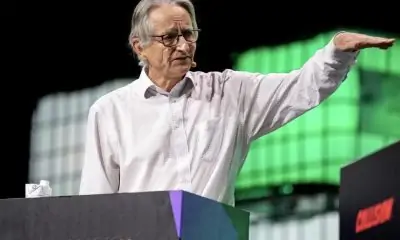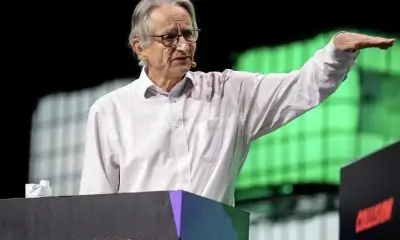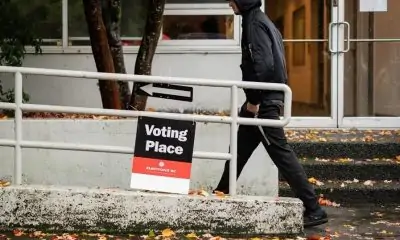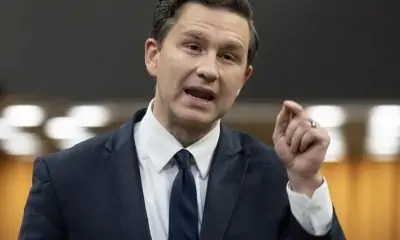Social media industry safety professionals and outside experts who have spent years trying to slow the empowerment of tyrants and violent mobs by Facebook and other platforms are aghast that a second major company might come under the control of just one person, especially one complaining that Twitter places too many limits on what can be posted on its site.
Media
Twitter under control of one person frightens online safety experts – The Washington Post

In tweets and a conversation that followed his surprise bid last week to take Twitter private, billionaire Elon Musk has decried decisions to bar some users as censorship and said moderation that blunts the spread of legal but offending content as going too far. “If it’s a gray area, let the tweet exist,” Musk said Thursday.
Such comments alarm those whose experience has been that unfettered speech makes social media platforms unusable and that lightly controlled speech favors those who can direct thousands to make versions of the same point, which is then amplified by algorithms designed to maximize engagement and thereby advertising dollars.
“This is a disaster, and it is not only about Elon Musk, but he kind of puts it on steroids,” said Shoshana Zuboff, a retired Harvard Business School professor and author of “The Age of Surveillance Capitalism,” which says that the money coming from the collection of data about human behavior is the lifeblood of a new and thus far nearly unregulated era.
Zuboff argues that social media companies like Facebook and Twitter extract as much data about users as possible then attempt to maximize their time on the site because that earns them money. But platforms, she argues, are not neutral. In driving users online, they alter not only discussions but also beliefs and even physical actions, encouraging people to do what they otherwise would not, such as joining protests in the real world.
Putting so much power in the hands of one company is bad enough, but putting it in the hands of one person, as is largely the case with Facebook shareholder Mark Zuckerberg and would be the case if Twitter were owned by Musk, would be incompatible with democracy, Zuboff said.
“There are simply no checks and balances from any internal or external force,” she said in an interview. It would leave Musk, like Zuckerberg, with an amount of assembled data about people and the ability to use it to manipulate them “that cannot be compared to anything that has ever existed, and allows intervention into the integrity of individual behavior and also the integrity of collective behavior.”
“Zuckerberg sits at his celestial keyboard, and he can decide day by day, hour by hour, whether people are going to be more angry or less angry, whether publications are going to live or die,” she said.
Facebook did not respond to a request for comment. Musk did not answer emailed questions. Zuckerberg, at least, has a board of directors and the Securities and Exchange Commission to look after the interests of shareholders. A private Twitter owned by Musk would not be mandated to have even that.
Zuboff thinks whole new institutions must come to life in the next decade to govern information spaces. Behind the controversy over Musk offering to buy Twitter is an ongoing debate about whether technology executives already hold too much control over online speech.
If Musk takes control of Twitter, that could add pressure on American policymakers to regulate social media companies, former officials told The Washington Post.
One person holding “near monopoly control” over a social network could only increase these worries among policymakers, said Bill Baer, a visiting fellow at the Brookings Institution in Washington.
“To have one individual who is an unpredictable commodity, to put it mildly, in control of such an important communications platform likely will make a lot of people nervous,” said Baer, who previously led antitrust enforcement at the Federal Trade Commission and the Justice Department.
In interviews, former Democratic regulators and anti-monopoly advocates said Musk offering to buy Twitter underscores the need for Congress to pass legislation governing the Internet. Tom Wheeler, the former chair of the Federal Communications Commission, said Musk is taking actions that highlight the need for the creation of a new regulator that would oversee the technology industry.
“What we need is a First Amendment-respecting process in which the government doesn’t dictate content but does cause there to be an acceptable behavioral code,” Wheeler said.
Even professionals who think that social media is a net good say that Twitter as Musk envisions it would be terrible for users and investors. The past few years have spawned any number of Twitter knockoffs catering to those who feel muzzled by the original, including Gab and Parler, but none has taken off in the mainstream.
That is not an accident, said Alicia Wanless, director of the Partnership for Countering Influence Operations at the Carnegie Endowment for Peace in Washington. People want basic rules in the same way they would avoid a nightclub that turns a blind eye to casual violence.
“Musk can buy Twitter and try to take it back to some nostalgic lost Eden of the early days of the Internet, but platforms with the least community standards, like Gab, hardly rank because it isn’t a good business,” Wanless said.
Eva Galperin, director of cybersecurity at the Electronic Frontier Foundation who has helped protect global rights activists from government hacking and ordinary people from domestic stalking, said she “would be concerned about the human rights and personal safety impacts of any single person having complete control over Twitter’s policies.”
She added, “I am particularly concerned about the impact of complete ownership by a person who has repeatedly demonstrated that he does not understand the realities of content moderation at scale.”
Citing Musk supporting the idea for allowing anything legal, Galperin said: “Twitter’s content moderation practices leave a lot to be desired, but they tried the policies that Musk seems to favor more than a decade ago, and it did not work.”
A pullback in moderation would disproportionately harm women, minorities and anyone out of favor with the establishment, civil rights advocates said. “Without rules of the road, we are going to be put in harm’s way,” said Rashad Robinson, president of the racial justice group Color of Change. “Our protections cannot be up to the whims of billionaires.”
Alex Stamos, the former Facebook chief security officer who called out Russian disinformation on that platform during the 2016 election, said Musk has a notion of Twitter as public square for free expression that is divorced from the reality of many individuals and failed to acknowledge that it would give more power to the most powerful.
Without moderation, Stamos said, “anybody who expresses an opinion ends up with every form of casual insult ranging to death and rape threats. That is the baseline of the Internet. If you want people to be able to interact, you need to have basic rules.”
“When you talk about a public square, it’s a flawed analogy. In this case, the Twitter town square includes hundreds of millions of people who can interact pseudo-anonymously from hundreds of miles away. A Russian troll farm can invent hundreds of people to show up in the town square.”
“The algorithm gets to decide who gets heard,” added Claire Wardle, a Brown University professor who studies misinformation and social media moderation policies. To Wardle, Musk sounds as if he is speaking from before the 2016 election, when the extent of foreign misinformation campaigns in the country shocked users and experts alike and accelerated more sophisticated moderation efforts that even now fall well short of their goals.
“We were just so naive because we didn’t understand the ways these platforms get weaponized,” Wardle said. “The idea that we would go back to where we were is a disaster.” But it fits with the entrepreneur’s documented disdain for regulations and regulators, whether they concern labor, auto safety or the stock market, critics noted.
Some Republicans have cheered Musk on as part of their argument that Twitter, which was the first platform to ban Donald Trump after the Jan. 6 attack on the Capitol, has been unfair to conservatives.
But a successful takeover might make new regulation out of Washington more likely amid a broader effort to rein in large technology companies. “Consolidating control is not the way to protect democracy and enhance free expression,” said Samir Jain, director of policy at Center for Democracy and Technology. “It will only exacerbate the concerns that people have over the degree to which these companies have influence over our discourse.”
If Twitter were to be taken private, its policies and decisions would become less transparent to policymakers and the general public, raising additional challenges for grappling with the role of tech companies, Baer said.
In the past year, Facebook whistleblowers have brought complaints to the SEC, alleging that the company misled investors about its efforts to address misinformation and accounts linked to rebels backed by Russia fighting in Ukraine. But such challenges would not be possible at Twitter if the platform were privately controlled.
“There would be less public disclosure, there would be less independent oversight,” Baer said. “There would not be the ability of independent directors on the board or individual shareholders to challenge or shape the behavior of Twitter, if it’s held solely by one individual.”
Media
Blood In The Snow Film Festival Celebrates 13 Years!
|
|
|
|
|
Media
It’s time for a Halloween movie marathon. 10 iconic horror films

Sometimes, you just have to return to the classics.
That’s especially true as Halloween approaches. While you queue up your spooky movie marathon, here are 10 iconic horror movies from the past 70 years for inspiration, and what AP writers had to say about them when they were first released.
We resurrected excerpts from these reviews, edited for clarity, from the dead — did they stand the test of time?
“Rear Window” (1954)
“Rear Window” is a wonderful trick pulled off by Alfred Hitchcock. He breaks his hero’s leg, sets him up at an apartment window where he can observe, among other things, a murder across the court. The panorama of other people’s lives is laid out before you, as seen through the eyes of a Peeping Tom.
James Stewart, Grace Kelly, Thelma Ritter and others make it good fun.
— Bob Thomas
“Halloween” (1978)
At 19, Jamie Lee Curtis is starring in a creepy little thriller film called “Halloween.”
Until now, Jamie’s main achievement has been as a regular on the “Operation Petticoat” TV series. Jamie is much prouder of “Halloween,” though it is obviously an exploitation picture aimed at the thrill market.
The idea for “Halloween” sprang from independent producer-distributor Irwin Yablans, who wanted a terror-tale involving a babysitter. John Carpenter and Debra Hill fashioned a script about a madman who kills his sister, escapes from an asylum and returns to his hometown intending to murder his sister’s friends.
— Bob Thomas
“The Silence of the Lambs” (1991)
“The Silence of the Lambs” moves from one nail-biting sequence to another. Jonathan Demme spares the audience nothing, including closeups of skinned corpses. The squeamish had best stay home and watch “The Cosby Show.”
Ted Tally adapted the Thomas Harris novel with great skill, and Demme twists the suspense almost to the breaking point. The climactic confrontation between Clarice Starling and Buffalo Bill (Ted Levine) is carried a tad too far, though it is undeniably exciting with well-edited sequences.
Such a tale as “The Silence of the Lambs” requires accomplished actors to pull it off. Jodie Foster and Anthony Hopkins are highly qualified. She provides steely intelligence, with enough vulnerability to sustain the suspense. He delivers a classic portrayal of pure, brilliant evil.
— Bob Thomas
“Scream” (1996)
In this smart, witty homage to the genre, students at a suburban California high school are being killed in the same gruesome fashion as the victims in the slasher films they know by heart.
If it sounds like the script of every other horror movie to come and go at the local movie theater, it’s not.
By turns terrifying and funny, “Scream” — written by newcomer David Williamson — is as taut as a thriller, intelligent without being self-congratulatory, and generous in its references to Wes Craven’s competitors in gore.
— Ned Kilkelly
“The Blair Witch Project” (1999)
Imaginative, intense and stunning are a few words that come to mind with “The Blair Witch Project.”
“Blair Witch” is the supposed footage found after three student filmmakers disappear in the woods of western Maryland while shooting a documentary about a legendary witch.
The filmmakers want us to believe the footage is real, the story is real, that three young people died and we are witnessing the final days of their lives. It isn’t. It’s all fiction.
But Eduardo Sanchez and Dan Myrick, who co-wrote and co-directed the film, take us to the edge of belief, squirming in our seats the whole way. It’s an ambitious and well-executed concept.
— Christy Lemire
“Saw” (2004)
The fright flick “Saw” is consistent, if nothing else.
This serial-killer tale is inanely plotted, badly written, poorly acted, coarsely directed, hideously photographed and clumsily edited, all these ingredients leading to a yawner of a surprise ending. To top it off, the music’s bad, too.
You could forgive all (well, not all, or even, fractionally, much) of the movie’s flaws if there were any chills or scares to this sordid little horror affair.
But “Saw” director James Wan and screenwriter Leigh Whannell, who developed the story together, have come up with nothing more than an exercise in unpleasantry and ugliness.
— David Germain
Germain gave “Saw” one star out of four.
“Paranormal Activity” (2009)
The no-budget ghost story “Paranormal Activity” arrives 10 years after “The Blair Witch Project,” and the two horror movies share more than a clever construct and shaky, handheld camerawork.
The entire film takes place at the couple’s cookie-cutter dwelling, its layout and furnishings indistinguishable from just about any other readymade home constructed in the past 20 years. Its ordinariness makes the eerie, nocturnal activities all the more terrifying, as does the anonymity of the actors adequately playing the leads.
The thinness of the premise is laid bare toward the end, but not enough to erase the horror of those silent, nighttime images seen through Micah’s bedroom camera. “Paranormal Activity” owns a raw, primal potency, proving again that, to the mind, suggestion has as much power as a sledgehammer to the skull.
— Glenn Whipp
Whipp gave “Paranormal Activity” three stars out of four.
“The Conjuring” (2013)
As sympathetic, methodical ghostbusters Lorraine and Ed Warren, Vera Farmiga and Patrick Wilson make the old-fashioned haunted-house horror film “The Conjuring” something more than your average fright fest.
“The Conjuring,” which boasts incredulously of being their most fearsome, previously unknown case, is built very in the ’70s-style mold of “Amityville” and, if one is kind, “The Exorcist.” The film opens with a majestic, foreboding title card that announces its aspirations to such a lineage.
But as effectively crafted as “The Conjuring” is, it’s lacking the raw, haunting power of the models it falls shy of. “The Exorcist” is a high standard, though; “The Conjuring” is an unusually sturdy piece of haunted-house genre filmmaking.
— Jake Coyle
Coyle gave “The Conjuring” two and half stars out of four.
“Get Out” (2017)
Fifty years after Sidney Poitier upended the latent racial prejudices of his white date’s liberal family in “Guess Who’s Coming to Dinner,” writer-director Jordan Peele has crafted a similar confrontation with altogether more combustible results in “Get Out.”
In Peele’s directorial debut, the former “Key and Peele” star has — as he often did on that satirical sketch series — turned inside out even supposedly progressive assumptions about race. But Peele has largely left comedy behind in a more chilling portrait of the racism that lurks beneath smiling white faces and defensive, paper-thin protestations like, “But I voted for Obama!” and “Isn’t Tiger Woods amazing?”
It’s long been a lamentable joke that in horror films — never the most inclusive of genres — the Black dude is always the first to go. In this way, “Get Out” is radical and refreshing in its perspective.
— Jake Coyle
Coyle gave “Get Out” three stars out of four.
“Hereditary” (2018)
In Ari Aster’s intensely nightmarish feature-film debut “Hereditary,” when Annie (Toni Collette), an artist and mother of two teenagers, sneaks out to a grief-support group following the death of her mother, she lies to her husband Steve (Gabriel Byrne) that she’s “going to the movies.”
A night out with “Hereditary” is many things, but you won’t confuse it for an evening of healing and therapy. It’s more like the opposite.
Aster’s film, relentlessly unsettling and pitilessly gripping, has carried with it an ominous air of danger and dread: a movie so horrifying and good that you have to see it, even if you shouldn’t want to, even if you might never sleep peacefully again.
The hype is mostly justified.
— Jake Coyle
Coyle gave “Hereditary” three stars out of four.
Read the full review here. ___
Researcher Rhonda Shafner contributed from New York.
Media
Sutherland House Experts Book Publishing Launches To Empower Quiet Experts
|
|
|
|
|
-

 Politics4 hours ago
Politics4 hours agoBreakingnews: Saskatchewan Party Leader Scott Moe wins seat in provincial election
-

 News6 hours ago
News6 hours agoSouth Bruce residents vote in favour of allowing underground nuclear waste storage
-

 News6 hours ago
News6 hours agoNobel winner Geoffrey Hinton has donated half of winnings to Indigenous water charity
-

 News4 hours ago
News4 hours agoFake content is getting harder to detect but Hinton has an idea to make it easier
-

 News14 hours ago
News14 hours agoSaskatchewan voters go to the polls on election day as parties vie for power
-

 Politics6 hours ago
Politics6 hours agoNew Brunswick Progressive Conservatives announce interim leader after election defeat
-

 News7 hours ago
News7 hours agoBritish Columbia’s tight election, by the numbers
-

 News7 hours ago
News7 hours agoPoilievre promises to abolish federal sales tax on new homes under $1 million























